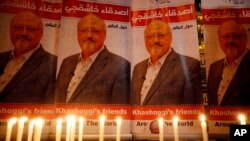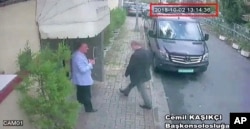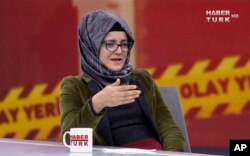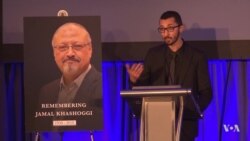Turkish President Recep Tayyip Erdogan says the order to kill Saudi journalist Jamal Khashoggi came from the "highest levels" of the Saudi government.
In an op-ed piece published Friday by The Washington Post, Erdogan said he did "not believe for a second" that Saudi King Salman had ordered the killing of Khashoggi. He also did not directly accuse Crown Prince Mohammed bin Salman.
Khashoggi, a Post columnist who had written critically of the Saudi crown prince, was killed after entering the Saudi Consulate in Istanbul last month to get a document he needed to marry his Turkish fiancee.
Erdogan wrote that the international community has the responsibility to "reveal the puppet masters" behind the killing.
Earlier Friday, a Turkish presidential adviser and friend of Khashoggi said his body was cut up and dissolved in acid for easier disposal, the Turkish newspaper Hurriyet reported.
"According to the latest information we have, the reason they dismembered his body is to dissolve it easier" before it was disposed of, Yasin Aktay told the newspaper.
After initially denying Khashoggi had been killed, the Saudi government claimed he died in an unplanned "rogue operation." Saudi public prosecutor Saud al-Mojeb offered a different explanation last week when he said the killing was premeditated.
State wants full probe
The U.S. State Department said Friday that it would continue to seek a full investigation into Khashoggi's death and that it was exploring the possibility of additional measures against anyone determined to be responsible.
State Department spokeswoman Heather Nauert marked the International Day to End Impunity for Crimes Against Journalists on Friday, saying the day was "particularly important" because of the Khashoggi case.
U.S. Secretary of State Mike Pompeo said Thursday that it might be a "handful more weeks" before the U.S. has enough evidence to impose sanctions on those responsible for Khashoggi's death.
Pompeo told St. Louis radio station KMOX that the U.S. administration was “continuing to understand the fact pattern" and added it was "reviewing putting sanctions on the individuals" who have so far been identified as being "engaged in that murder."
In his first public reaction Friday, Israeli Prime Minister Benjamin Netanyahu called the killing "horrendous" and said responsive action must be taken.
"At the same time, I say that it's very important ... for the region and [for] the world that Saudi Arabia remain stable," Netanyahu told reporters in the Bulgarian city of Varna, where he was attending a summit with the prime ministers of Bulgaria, Greece and Romania and the president of Serbia. "I think that a way must be found to achieve both goals, because I think the larger problem is Iran."
Iran has denied accusations it is building a nuclear bomb, saying weapons of mass destruction are prohibited under Islam.
Khashoggi's fiancee wrote in an op-ed piece published Friday in the Post that the Trump administration's response to Khashoggi's death has been "devoid of moral foundation."
"Of all nations, the United States should be leading the way in bringing the perpetrators to justice," Hatice Cengiz wrote.
The New York Times, quoting two people familiar with the matter, reported Friday that White House officials knew from an Oct. 9 phone call with the Saudi Crown Prince that he considered Khashoggi a dangerous Islamist, and therefore knew the Saudi prince had a potential motive for the killing. But because of its deep investment in Prince Mohammed as the main linchpin of the administration's Middle East agenda, the Trump administration concluded it could not feasibly limit his power.
WATCH: Khashoggi's Fiancée Appeals to Trump to Seek Justice for His Killing
More than 100 members of PEN America, a New York-based nonprofit group of journalists and artists devoted to human rights and free expression, have called on the U.N. to launch an independent probe into the killing.
"The violent murder of a prominent journalist and commentator on foreign soil is a grave violation of human rights and a disturbing escalation of the crackdown on dissent in Saudi Arabia, whose government in recent years has jailed numerous writers, journalists, human rights advocates and lawyers in a sweeping assault on free expression and association," the group said Friday in an open letter.









